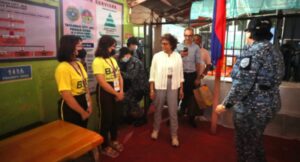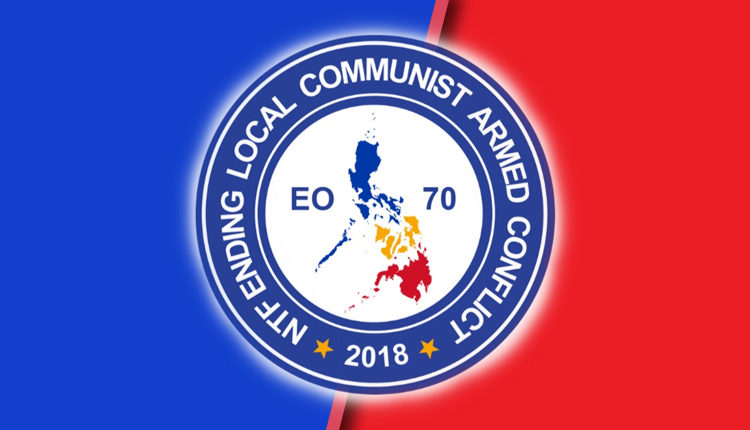WITH the Communist Party of the Philippines (CPP) gasping for life in the domestic front, the National Task Force to End Communist Armed Conflict (NTF-ELCAC) is now eyeing to confront the terrorist group’s deception operations abroad.
“There are some hindrances abroad that we cannot fully do what we can do in countering the efforts of CTGs. But we will establish soon ‘yung ganun na mechanism in selected countries kung saan malakas ang mga CTGs (communist terrorist groups),” said NTF-ELCAC executive director, Ernesto ‘Jun’ Torres, a former 3-star general of the Philippine Army as quoted by the Philippine Information Agency (PIA) last October 18.
Torres made the remark at the conclusion of the task force’s third quarterly assessment of its accomplishments held in Baguio City.
He added the government is studying the possibility of “rebranding” the task force into the ‘National Coordinating Council for Unity, Peace, and Development’ with parallel council overseas.
The change of name is partially in response to the observation of Irene Khan, the United Nations Special Rapporteur on freedom of opinion and expression, during her country visit last January.
Khan, who has been in close touch with CPP front organizations even prior to her arrival, again criticized the NTF-ELCAC especially over the issue of “red-tagging.”
A review of the ICHRP’s website showed unmistakable signs of its being wholly penetrated by CPP operatives since its creation in July 2013 in Quezon City under the Macapagal Arroyo administration.
At the time, Khan, like the other UN Special Rapporteurs influenced by CPP operatives also called for the abolition of the NTF-ELCAC.
Torres, however, argued that given its success in countering CPP deceptions, changing its name to focus on peace, national unity, and development is already on the government’s agenda.
Due to its long-time organizing efforts abroad dating back to the establishment of the National Democratic Front in April 1973, the CPP has managed to penetrate even the offices of the United Nations and the various Western non-government organizations (NGOs) for funding and political support. The NDF is the same as the National United Front Commission (NUFC) under the CPP’s Central Committee.
Its success abroad enabled the CPP to sell such bogus terms like ‘red tagging.’ Aside from the term shielding its cadres and organizers from being charged for terrorist activities, the CPP is also using red tagging as a propaganda tool to accuse the government of gross violation of human rights, especially in the international community.
“In addition to our domestic initiative, the fight must extend internationally. We must confront and dismantle their harmful narratives abroad and work in collaboration with global partners to cut off any sources of funding,” Torres told the PIA.
Ironically, the CPP’s front organizations these days are very much active in the mainland United States, the Philippines’ “strategic ally” and the most rabid anti-communist country in the world, and in Europe, also another haven of anti-communism.

During the Duterte administration, the NTF-ELCAC already laid down the foundation for its international campaign by bringing the issue of the CPP’s exploitation of the country’s indigenous peoples (IPs) in various international fora.
The campaign gained some measure of success, but this proved unsustainable due to budget and manpower constraints leading to the CPP’s front organizations dominating the global narrative on the state of human rights in the Philippines.
A case in point is the alleged “abduction” of Fhobie Matias, a 22-years old fighter of the New People’s Army (NPA) operating in Mindoro Island who surrendered to the 203rd Brigade of the Philippine Army last September 28. Matias was fetched by her mother and boyfriend, an NPA surrenderer, from an NPA “safehouse” in Laguna. The NPA is the armed wing of the CPP.
A statement last October 11 by the ‘International Coalition for Human Rights in the Philippines’ (ICHRP) claimed Matias’ family is seeking help after she was “abducted” by soldiers in Laguna and her present whereabouts were “unknown.”
BGen. Randolf Cabangbang, 203RD Brigade commander, in a talk with Pinoy Exposé, vehemently denied the accusation of abduction pointing to Matias’ surrender as attested by her affidavit and that of her mother and boyfriend. “I dare them (ICHRP) to file a case in court,” he added.
Cabangbang warned nobody should be surprised if after a while, CPP front organizations started a fund campaign on her behalf.
A review of the ICHRP’s website showed unmistakable signs of its being wholly penetrated by CPP operatives since its creation in July 2013 in Quezon City under the Macapagal Arroyo administration.
Another case is that of Frenchie Mae Cumpio, a regional secretary of the CPP in Eastern Visayas now under detention and undergoing trial for illegal possession of firearms and terrorist financing in Tacloban after her arrest in February 2020, along with 4 other CPP members.
The CPP’s propaganda over the case of Cumpio claiming she is just a “journalist” proved successful with Khan even paying her a visit on January 27 and calling for her release afterwards.
Cumpio’s advocates were also granted an audience by the British ambassador to the Philippines (with additional reporting from PIA).




Comments are closed.